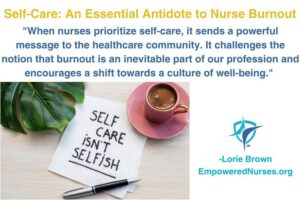Self-Care: An Essential Antidote to Nurse Burnout

In the demanding world of nursing, where compassion and dedication know no bounds, it’s all too easy to fall into the trap of neglecting oneself. Nurses are the unsung heroes, tirelessly tending to the needs of others, often at the expense of their own well-being. However, it’s crucial to recognize that self-care is not only vital but also a powerful tool in combating nurse burnout—a pervasive issue that affects the very essence of our profession. Let’s talk about why self-care is not selfish but rather a lifeline for nurses.
Nurse burnout is a silent epidemic that silently creeps into the lives of even the most passionate and resilient caregivers. The long hours, demanding schedules, emotional intensity, and constant exposure to suffering can gradually drain even the most dedicated among us. Burnout can manifest in various forms—physical exhaustion, emotional depletion, decreased empathy, and an overall sense of disillusionment. It not only compromises our own well-being but also threatens the quality of care we provide to our patients.
Self-care becomes an urgent necessity for nurses, acting as a lifeline amidst the storm of burnout. It is a means of refueling our physical, emotional, and spiritual reserves so that we can continue to offer the highest standard of care to those who rely on us. Not just our patients but also our families. By engaging in self-care practices, we replenish our energy, restore our resilience, and prevent the insidious erosion of our passion for nursing.
Contrary to popular belief, self-care for nurses is not synonymous with selfishness. In fact, it is an act of self-preservation and self-love that enables us to sustainably care for others. Just as the safety instructions on an airplane remind us to secure our own oxygen mask before assisting others, we must prioritize our well-being to be effective caregivers. When we neglect self-care, we risk reaching a point of no return—a state where our ability to provide compassionate care becomes compromised.
Practicing self-care as a nurse involves honoring our physical needs. It means embracing healthy habits, such as nourishing ourselves with nutritious meals, staying hydrated, and engaging in regular exercise. Taking breaks during shifts, ensuring adequate rest, and seeking support for physical ailments are also essential aspects of self-care. By prioritizing our physical well-being, we build a foundation of strength and endurance necessary to navigate the challenges of our profession.
Equally important is addressing our emotional and mental well-being. Nurses are exposed to intense and often traumatic situations, which can accumulate and weigh heavily on our hearts and minds. Engaging in activities that promote emotional resilience, such as journaling, meditation, therapy, or joining support groups, can provide a safe outlet for processing our emotions and building coping mechanisms. Self-compassion, kindness, and forgiveness toward ourselves are vital ingredients for sustaining our emotional well-being.
Spiritual self-care, regardless of religious beliefs, nourishes the soul of a nurse. Connecting with our inner selves, finding solace in nature, practicing mindfulness or meditation, or engaging in creative pursuits can rejuvenate our spirits. These practices provide moments of respite from the demands of our profession and remind us of our deeper purpose—to bring healing and comfort to those in need.
When nurses prioritize self-care, it sends a powerful message to the healthcare community. It challenges the notion that burnout is an inevitable part of our profession and encourages a shift towards a culture of well-being. By practicing self-care, we become advocates for ourselves and our colleagues, fostering an environment where our mental and emotional health are recognized as essential components of providing quality care.
In conclusion, self-care is not selfish; it is a vital investment in the well-being of nurses and the patients we serve. By embracing self-care practices, we can combat burnout sustain our passion for nursing, and ensure that we continue to provide compassionate care. Let us reclaim our well-being, not as an act of selfishness, but as an act of profound dedication to our noble profession. Remember, we cannot pour from an empty cup, but with self-care, our cups will overflow with compassion, resilience, and unwavering care.


